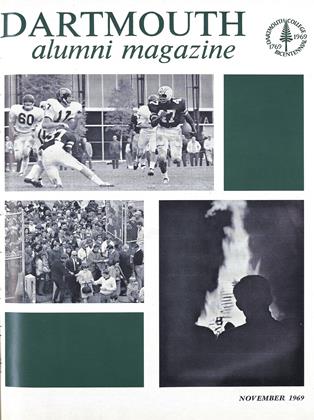During his student years at Dartmouth, RICHARD P. WHITE '18 had a perplexing choice to make regarding his professional career - whether to minister to the needs of his fellow man as a medico-pathologist or, as a plant pathologist, to protect and nurture the galaxy of Mother Nature's family, whose well-being is so essential to human existence.
The original inspiration for his future came during freshman year when he studied botany under Dr. George R. Lyman and Prof. Arthur H. Chivers '02, of whom White says, "To him I owe an unpayable debt of gratitude." Chivers sent him to Cornell for a Ph.D. and three years of research on plant diseases, then on to the Kansas Agricultural College and Experimental Station, where for six years he taught and did more research. In 1927 White went to Rutgers to occupy the first chair of ornamental plant pathology in the country.
Soon after taking this new post, he became secretary of the National Shade Tree Conference, an organization of arborists, park superintendents, local and state tree executives, and plant scientists. During the next ten years he published 313 articles as assistant editor of the official journal, Phytopathology, and the monthly journal, Nursery Disease Notes. As a result of all these activities his name became a by-word with arborists, florists, nurserymen, and horticulturists in all sections of this country.
On January 1, 1938, Dick White became executive secretary of the American Association of Nurserymen, with headquarters in Washington. For the next 23 years, during which time he acquired the title of executive vice president, the work of this Association became the main segment of his professional career. Under his leadership, membership grew from 352 to 1600 by the time he retired in 1961.
But White says now, "I really never did retire. There has always been something ahead to do. Although I may have 'formally' retired from the American Association of Nurserymen, they immediately made me a Consultant, and asked me to set up the Horticultural Research Institute, which is now organized, well-financed, and has several projects under way in marketing and management. Then I realized that the Association would be celebrating its 100 th anniversary in 1975. So, I have assigned myself to research and prepare its centennial history. My present task finds me in the archives of the National Agricultural Library or the Library of Congress, digging out the 'who's who' of early days."
Last year Dick White took on still another job when he was named Chairman of the U.S. National Arboretum Council. The National Arboretum was established in 1924 by an Act of Congress as an advisory body which, through a fifteen-member council, confers with the Secretary of Agriculture, and recommends projects involving new plant species. Its present agenda includes the breeding and development of new strains of shade trees, such as hollies and magnolias.
Over the years numerous awards have been presented to Dr. White, but the one he prizes most highly is the George Robert White Gold Medal of Honor presented to him in 1954 by the Massachusetts Horticultural Society. He was the youngest man ever to receive the Medal, described as the highest horticultural award in this country, possibly in the world. He was cited for his "outstanding service to the nursery trade in pioneering a program for professional horticulture in America.... He has striven for high standards in nursery practices and has been an outspoken opponent of false advertising. His efforts in advancing the 'Plant America' program have met with outstanding success in all parts of the country, especially in landscaping industrial plants."
When asked what facet of his career has proved to be the most satisfying teaching, research or administration— Dr. White stated, "I think I got more out of organizing and building up the Nurserymen's Association into an active, virile group than any other activity in my whole life."
He appears to discount his professional prowess by stating - "I was never a real horticulturist, but more of a 'business horticulturist,' if there is such an animal."
 View Full Issue
View Full Issue
More From This Issue
-
 Feature
FeatureBlack Studies: A Beginning
November 1969 By SUSAN LIDDICOAT -
 Feature
FeatureThe Most Dangerous Gap of All
November 1969 By THOMAS J. McINTYRE '37 -
 Feature
FeatureThe Dean Charts a Course
November 1969 -
 Feature
FeatureA Conclave of Noted Scientists
November 1969 -
 Feature
FeatureCOED EXCHANGE
November 1969 -
 Article
ArticleWith the Big Green Teams
November 1969







